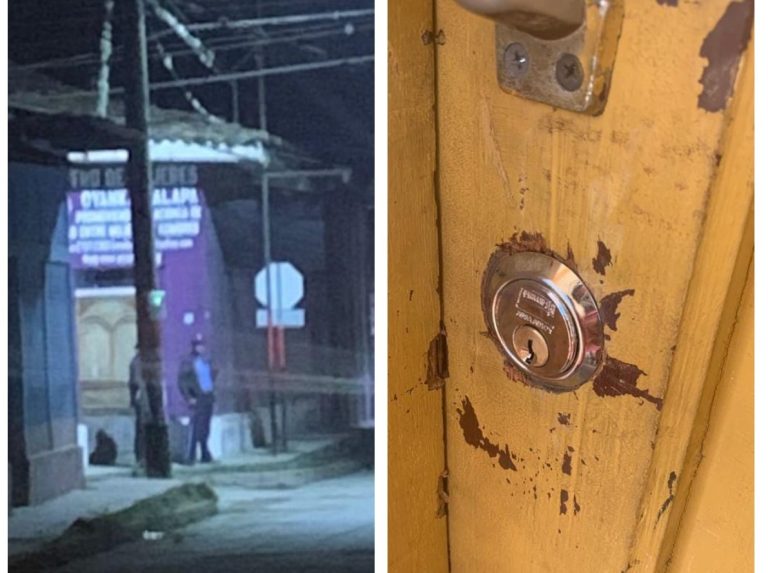18 de noviembre 2021

Children of Exile: The Births “Sowing Hope” in the Camp of Nicaraguan Farmers

PUBLICIDAD 1M
PUBLICIDAD 4D
PUBLICIDAD 5D
Last August, Nicaragua’s National Assembly, controlled by the Ortega regime, arbitrarily stripped the organization of their legal status

Police, members of the ruling Sandinista Party, and private security guards have taken over two properties belonging to the Jalapa Women’s Association against Violence (Jalapa – Oyanka). The sites held the organization’s offices and a shelter, members denounced.
In a brief interview with Confidencial, one of the Oyanka members explained that two people known in the municipality as members of the government party arrived at the organization’s two sites around 7:45 in the morning of November 11 and changed the locks. The organization had received no prior notification, and no court order was shown.
“Two men arrived, escorted by some motorcyclists in civilian clothes, and changed the locks on the main door of the Oyanka offices. Later, the police arrived to guard the outside of the building,” the source denounced.
The speaker added that a similar process of changing the locks and installing a police guard subsequently took place at another Oyanka property, which had functioned as a women’s shelter.
The Jalapa Women’s Association against Violence was stripped of its legal status last August, by order of the National Assembly, which is controlled directly by the regime of Daniel Ortega and Rosario Murillo.
Members of Oyanka noted that the Interior Ministry “issued no information” on the takeover of the Association’s property, despite the fact that it’s the organization’s right to decide what to do with the property or assets they hold.
“We had already prepared a report in which we were looking at possibly donating both properties to other organizations that shared Oyanka’s objectives, although they weren’t necessarily based in the same municipality,” the members stated.
Some members complained that they’d been “waiting” for some notification from the Interior Ministry, and accused the government of seizing both properties “by force”. This move corresponds to “a maneuver to seize our assets, because notification never arrived and the arguments they presented to cancel our legal status never existed.”
The decree annulling Oyanka’s legal status, along with that of 14 other non-profit organizations, stated: “the property and assets belonging to the associations and foundations shall, after liquidation, have the use provided for in the constitutive act or in their condition. If there is no provision for them, they will become the property of the state.”
The cancellation of Oyanka’s legal status was based on a report from Franya Urey Blandon, director of the Department of Registration and Control of Associations, an office of Nicaragua’s Interior Ministry. In her report, Urey indicated that the association, like the 14 other NGOs, were “headless”, because their directive boards had passed the deadline for renewal. In addition, they were accused of not having submitted their “detailed” financial reports “for a number of years”.
However, the Oyanka members affirm they complied at all times with their required reports to the Ministry. They asserted that the functionaries of said Ministry, “set up a series of obstacles to avoid receiving them [the reports].” The organization’s members also stressed that their Directive Boards were correctly constituted, and that they even held special elections on two occasions, to comply with changes requested by the Ministry.
In addition, they denounced that the closure of the Association has seriously affected the women who are victims of violence in Jalapa. The organization, based in a municipality of Nicaragua’s northwestern Nueva Segovia department, has been “for 25 years the only center. It was a point of reference for women victims of violence, the only one accessible to the women of Jalapa. Now those women are abandoned, with no one to accompany them, or assist them in finding access to justice.”
Oyanka was granted legal status on October 29, 1998. Until this status was abruptly cancelled last August, there were 50 women associated with the organization. In addition, there were 36 women’s groups organized in the different rural communities of Jalapa, each with twenty or thirty members.
During the first half of 2021, the Ortega regime, working through the regime-controlled National Assembly, unilaterally annulled the legal status of 45 different NGOs. Dozens of others had the same fate since late 2018.
This article was originally published in Spanish in Confidencial and translated by Havana Times
PUBLICIDAD 3M
Confidencial es un diario digital nicaragüense, de formato multimedia, fundado por Carlos F. Chamorro en junio de 1996. Inició como un semanario impreso y hoy es un medio de referencia regional con información, análisis, entrevistas, perfiles, reportajes e investigaciones sobre Nicaragua, informando desde el exilio por la persecución política de la dictadura de Daniel Ortega y Rosario Murillo.
PUBLICIDAD 3D